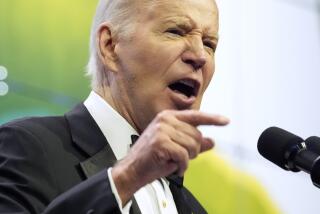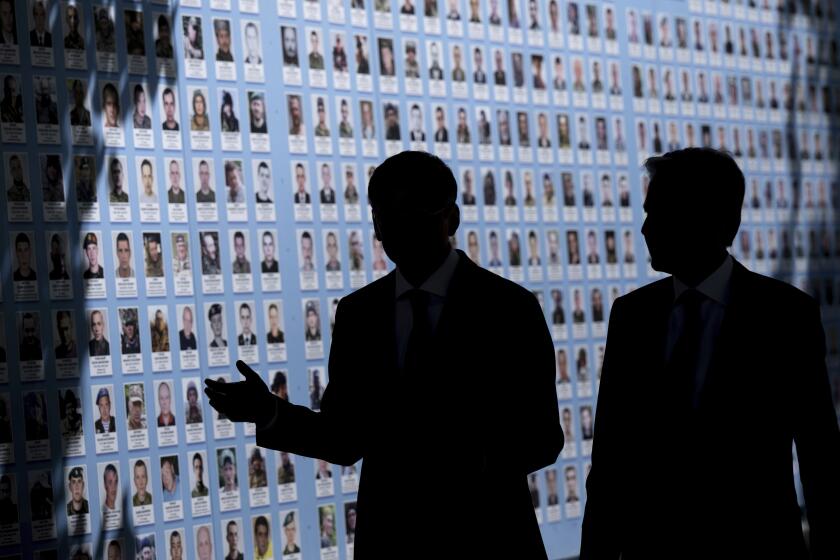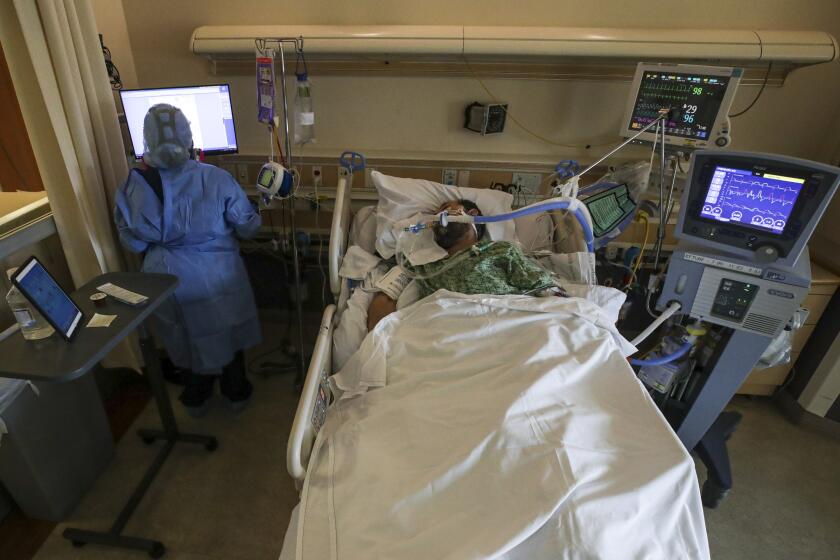Israel Enters West Bank Towns in Hunt for Palestinian Militants
Marking the start of what Israeli officials described as a campaign to hunt down Palestinian militants and bomb-making laboratories in the wake of a deadly suicide blast, Israeli troops and tanks pushed into West Bank cities and villages overnight, arresting half a dozen wanted men, demolishing homes and engaging in scattered exchanges of fire.
Israel coupled the raids with a warning to Palestinian Authority Prime Minister Mahmoud Abbas that he must crack down decisively on Palestinian militant organizations or a U.S.-backed peace plan would fall apart.
For Israelis, it was a day of tear-choked funerals, quiet prayers at a candlelit street shrine that sprang up at the site of Tuesday’s bus bombing in Jerusalem, and agonizingly long waits for final identification of the dead.
The assailant, dispatched by the extremist group Hamas, targeted a double-length bus carrying devoutly observant Jewish families home from evening prayers at the Western Wall, Judaism’s holiest site.
Twenty people were killed along with the bomber. Five U.S. citizens, some of whom also held Israeli citizenship, were among the dead. Dozens of wounded, many of them children, remained hospitalized.
In raids early today, Israeli tanks and armored personnel carriers entered the northern West Bank towns of Nablus and Jenin, as well as several surrounding villages.
Israeli security sources described the area as a “hotbed of terrorist activity.”
Late Wednesday, tanks also took up positions outside the West Bank city of Ramallah, site of Palestinian Authority President Yasser Arafat’s headquarters, but they did not enter the city.
Israeli security sources described the encirclement of Ramallah as a response to terrorist threats emanating from the city and stressed that Arafat’s compound was not a target.
“This is a pinpoint deployment, and there will be others like it,” one security official said.
Israeli officials and media reports said Prime Minister Ariel Sharon had given his approval Wednesday night for a series of wide-ranging strikes targeting Palestinian militants in the West Bank -- a step that could raise the specter of a new wave of reprisal attacks by militant groups.
President Bush called Sharon on Wednesday from his ranch near Crawford, Texas. White House Press Secretary Scott McClellan declined to say whether Bush asked the Israeli leader to exercise restraint in responding to the bus bombing.
Secretary of State Colin L. Powell telephoned Abbas, McClellan said.
“We continue to call on the Palestinian Authority to act to dismantle terrorist organizations,” McClellan said.
The bus bombing was said to have been carried out in part to avenge the death of an Islamic Jihad leader, Mohammed Sidr, in an Israeli raid last week in the West Bank town of Hebron.
Israeli military sources said the Israeli troop presence outside West Bank cities and towns was expected to be increased in coming days.
Before the overnight raids, Foreign Ministry spokesman Jonathan Peled said that Israel intended to show “responsibility and restraint” in its military actions but that troops would aggressively hunt suspects and weapons throughout the West Bank.
Although Tuesday night’s suicide attack represented the gravest blow yet to the faltering U.S.-sponsored peace initiative known as the “road map,” analysts on each side of the Israeli-Palestinian divide suggested that, in the longer term, both governments still had a strong vested interest in keeping the plan alive.
Because of this, they said, limited progress on the peace initiative might resume at some point -- provided the latest attack did not signal the start of a concerted new campaign of violence by militants, who for the last seven weeks had largely adhered to a self-imposed cease-fire.
“By the kind of macabre calculus in this part of the world, there are judgments about what breaks the camel’s back, and I don’t see this attack as being in that category, as long as it’s isolated,” said political analyst Mark Heller. “And I don’t think either side wants to be the one perceived as sinking this initiative.”
Still, it was clear the attack would at least temporarily halt what had already been fitful implementation of the initial elements of the Mideast peace initiative.
Israel announced hours after the bombing that it was freezing any move to pull out of more West Bank cities and towns, calling off meetings with Palestinian officials and clamping a tight military closure on the West Bank and Gaza Strip.
Abbas and his aides said they would hunt and arrest those behind Tuesday night’s bombing. Palestinian officials pointed out, however, that Hebron, the West Bank town from which the bomber was dispatched by a local Hamas cell, was under the control of the Israeli army.
Early today, the home of the bomber was demolished by Israeli troops. The home of another bomber was demolished in Jenin.
Israel made it clear that it expects Palestinian security forces to carry out an intense campaign against the armed militant factions -- something Abbas has resisted, saying it would be tantamount to civil war.
The Palestinian Cabinet met in emergency session Wednesday night in the Gaza Strip to map out its strategy for steps against the militants. But Information Minister Nabil Amr said no decisions would be finalized until after details of the discussion had been reported to Arafat. Senior officials arrived at Arafat’s headquarters for talks that continued late into the night.
In their own security consultations Wednesday, Israeli officials weighed the idea of a strike against Arafat’s half-wrecked compound but decided against it, according to Israeli media reports.
Even some right-wing Israeli political figures suggested this was not the right moment for such a move, saying it would distract from the urgent need for a crackdown on the militant groups.
“I suggest we stop pointing the finger at Yasser Arafat and demand unequivocally that Abu Mazen [Abbas] fulfill their responsibilities,” Education Minister Limor Livnat told Israel Radio.
Abbas, however, faces the same problem he has grappled with since the two sides endorsed the peace plan at a June summit.
Many believe he lacks the street credibility and political capital to mount a head-on challenge of the armed militant factions, which have a large, popular following.
Abbas “didn’t start out in a safe position, and I think it’s getting less safe as he goes along,” said Sari Nusseibeh, a prominent Palestinian intellectual. “Abu Mazen is not used to confrontation ... and if the question is will the people tolerate it [a crackdown], my answer is probably not.”
Sharon, by contrast, has the luxury of broad domestic support, and the public probably would back whatever course of action he chose, including forgoing a large-scale military response to the bombing, said Efraim Inbar, director of the Begin-Sadat Center at Bar-Ilan University.
“The left is lauding him, and the right wing is criticizing him, which he always uses to his advantage in Washington,” Inbar said. “He’s doing fine politically.”
Israeli public opinion, however, usually favors sharp military action in retaliation for any serious attack -- particularly one as horrific as Tuesday’s, with its indelible images of rescuers cradling children who were bleeding badly and had scorched hands and faces.
Nearly 40 children were taken to hospitals, and there were harrowing scenes as frantic parents searched for babies and toddlers from whom they were separated in the chaos of the explosion. Two infants were among the dead.
It took forensics experts all Wednesday to finish identifying the victims. Some bodies were so badly disfigured that pathologists had to use dental records and DNA samples.
“The effects of this attack were especially awful since it took place in a closed space, with such a big bomb, and because of all the shrapnel,” said Yehuda Hiss, the country’s chief pathologist.
Times staff writer Maura Reynolds in Crawford contributed to this report.
More to Read
Start your day right
Sign up for Essential California for news, features and recommendations from the L.A. Times and beyond in your inbox six days a week.
You may occasionally receive promotional content from the Los Angeles Times.






